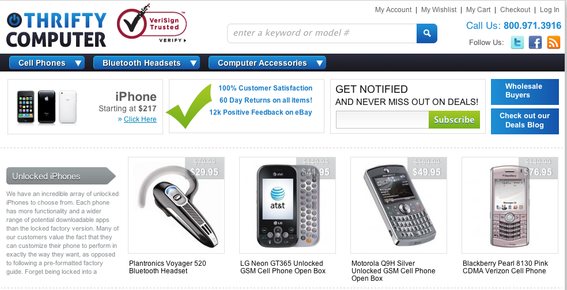“Lessons Learned” is a series where we ask ecommerce owners to share their experiences, good and bad. For this installment, we corresponded with Elchonon Hellinger, founder of Miami, Florida-based Thrifty Computer, a retailer of new and refurbished computers, cell phones and electronic components.
Hellinger is 26 and he runs the business with his brother Yosef, who is 22. He started in 2003 by drop-shipping computer accessories that he sold on eBay. He then launched his own website, ThriftyComputer.com, and by 2009 gross sales were nearly a million dollars. Unfortunately, net losses for that year were large and the company incurred nearly $100,000 in debt.
But he didn’t close the business. Yosef persuaded him to regroup and try again.
Says Elchonon, “In 2009 we did close to $1 million in sales but ended with huge losses. Sales for 2010 were between $400,000 to 500,000, but no losses. We were paying off 2009 debt. In 2011 we’re averaging about $70,000 a month in sales.”

ThriftyComputer.com
As for his background, Elchonon first wanted to go to law school. But a rare disease that generates benign tumors left him deaf. It forced him to reconsider another career. He says, “I did not attend college. I’ve always been computer and business savvy, I had a number of part time jobs in the tech industry, starting when I was 15. My first job was scanning collectible books and selling them on eBay on a 56K modem. Other jobs include sales at a web design firm, customer service for a web hosting firm, and customer service for a software company.”
Elchonon shares the lessons he’s learned, below.
Shopping Carts

Elchonon Hellinger
“I had a friend that was developing a website back in 2004. This was a novelty then, so he recruited me to set up a store mostly as a showcase. It was a very straightforward system. I had just PayPal Express [for customer payments]; I did not take it seriously.
“Eventually I started reading on search engine optimization. I did research and settled for X-Cart, which was a great solution. I stocked it up with modules and sales grew. I did a lot of custom development.
“Then a friend suggested we try Magento. I was blown away by it, but did not understand the complex open source software. I tried to replicate my X-Cart setup and build the dream site. I wasted a year and some $10,000. Now we use Magento, and continue to develop.”
Credit Card Payments
“At first we used just PayPal Express. When Google Checkout was released, we set that up. Eventually we set up a credit card merchant account, which buyers prefer. But string of fraud chargebacks forced us to find a [fraud prevention] solution. We currently have no fraud and we strongly warn other merchants not to play games in this department.”
Order Management
“My years of experience have taught me that no buyer wants a mixed-up or botched order. We use a custom ‘order status’ system that I developed. I also developed a flagging system that I now see is sold as a Magento module. We use notes, tracking, tickets, RMAs and such — all shown on one internal management page. This enables us to instantly get the full picture — and offer the best customer service.”
Hosting
“I have used many hosts, including GoDaddy, Bluehost, and SimpleHelix. But, by far, Nexcess is the best. These guys are there 24/7 to help and advise and fix issues not always hosting related.”
Search Engine Optimization
“I have been blessed and cursed in this department. I understand SEO well. The issue was getting it together, whether it’s website audits, on-and-off page content, shady SEO companies outsourcing their labor and so on.
“My advice is do it yourself on SEO, or hire a U.S. based firm. I have advice for U.S. firms, too: Be transparent.
“There is no easy SEO fix I have learned. It’s vital that you study the SEO factors and have a plan, whether it’s on-or-off page content.”
Employees
“This is about treating your employees right. I treat them as partners. Never yell, be understanding about screw-ups — because bosses do it, too. Sometimes I’m too quick to believe a customer complaint, only to find out that the customer was confused or wrong. I try to be a positive example of hard work and honesty.”
Shipping
“We do our best to ship within 24 hours on a business day. We try to charge actual shipping costs. We use UPS and USPS.”
Product Sourcing

Yosef Hellinger
“I have had good and bad suppliers. Right now, we are very picky; we deal with a select few. These are people we trust to deliver the product and they trust us to pay. We never have fights and are quick to iron out any disagreements. And we go both ways: We sell to our suppliers at times, too. This is something never to overlook.
“We have also been ripped off a few times [by suppliers], so we don’t deal with any one supplier unless people we trust can vouch for it.”
Customer Service
“Customer service his the foundation of the business. I learned this the hard way. No matter how flashy your site is, or how low your prices, customer service is the bottom line.”
Biggest Mistakes
“[In 2009,] I let sales numbers blind me. I was just overwhelmed by the sheer dollar amount of sales and growth that I did not focus on profit. I had figured wrong that the bigger we grew, the more I could ‘margin out’ the costs. But this proved wrong.
“Bad suppliers; taking on bad partners because I was overwhelmed; no solid cash foundation; lack of business focus on direction: These were my primary mistakes. I had read business books, but all I knew was sales. And to sell I needed to be the cheapest.
“I have erred a lot when it comes to website development. I’m always creating too much and [I get] bogged down in wasted time and developer costs.”
Biggest Successes
“Establishing key contracts and relationships. We work closely with large suppliers across the U.S. We have been focusing on niche products, ‘open-box’ phones, refurbished phones, and iPhones in particular.
“Taking my younger brother on as a partner was my best decision, although he was only 20 at the time. We have grown together. We work together, listen to each other. He is the more focused one, overseeing day-to-day operations. I deal with sales and business development, trying out new services and features.
“We measure success in the number of happy buyers. We know that they will keep returning and that we will keep raising our standard of service.”




